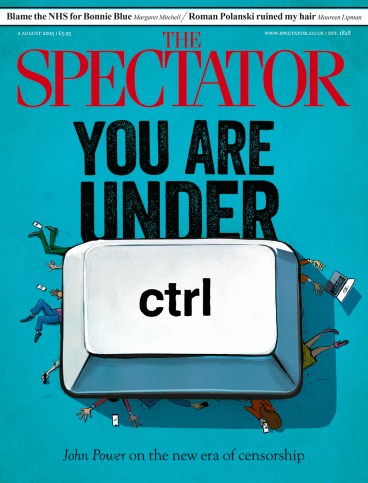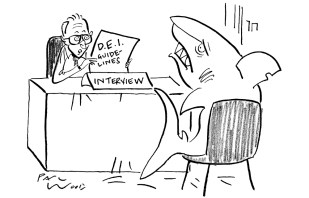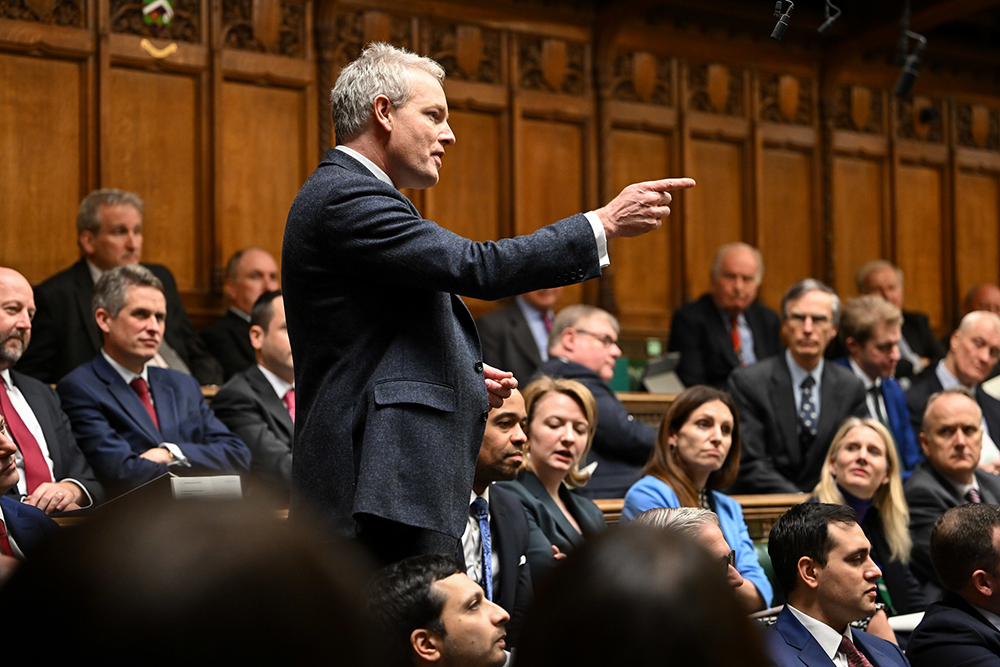
I’ve seen signs of life in the Conservative party – unlikely I know, but true. I had thought it a dead thing, dripping its life-blood slowly into Reform. But ten days ago I saw on YouTube a speech that a Tory MP gave in the House of Commons and… I don’t know. I felt hope.
The MP was Danny Kruger, member for East Wiltshire, and as it happens he’s a friend of mine. I’ll say straight away then that this is absolutely not an attempt to promote him as next leader, though the post-Kemi era does seem to be approaching fast.
For one thing, Kruger is a middle-aged white Etonian, cursed by association with the last two Etonian PMs. For another, from what I’ve seen of it, high office acts like high altitude on humans. The rarified air gets to them in the end. They go crackers for want of normality, and when they descend their brains have changed. Fundamentally decent men become deluded – Rishi. The others – Boris – live as high-functioning addicts, dreaming of the next power-fix.
So it’s not that I have ideas about party leadership. It’s just that I’d clean forgotten it’s even possible for a politician to stick their neck out in public – to state simply what they believe – and how powerful that is.
Kruger’s speech, addressed to his fellow MPs, made the point that this country is Christian in its bones and in its beginnings and that, like it or not, through the parish system, we are all members of the Church of England. If there’s a crisis in this country, he said, which there indisputably is – an epidemic of anxiety and hopelessness in the young, among adults even talk of civil war – then it’s to Christianity that we should turn. I know: sky fairies and invisible friends – perhaps you thought we’d outgrown them.
I’d forgotten that it’s possible for a politician to state simply what they believe – and how powerful that is
There are two religions moving into the space from which Christianity has been ejected, said Kruger. One is Islam; the other is wokery, which has become competitive oppression – victim-signalling, you could call it. ‘I don’t think that “woke” does justice to its seriousness,’ said Kruger. ‘It is a combination of ancient paganism, Christian heresies and the cult of modernism all mashed up into a deeply mistaken and deeply dangerous ideology of power that is hostile to the essential objects of our affections and our loyalties: families, communities and nations… It must simply be destroyed at least as a public doctrine. It must be banished from public life from schools and universities and from businesses in public services.’
It was a Thursday afternoon, about 4 p.m. when Kruger addressed the House. Most MPs, having lunched, had drifted back to their constituencies, so you have to picture the MP for East Wiltshire delivering this tub-thumper to an almost entirely empty chamber: row upon row of plump green benches, punctuated with just the odd crumpled suit.
‘The fact is that the strong gods are back, and we have to choose which god to worship,’ said Kruger, undaunted. ‘I suggest we worship the God who came in the weakest form, Jesus Christ.’ The room may have been empty but more than three million people have now watched the footage online. The comments keep rolling in, thousands of them: ‘Don’t worry, we’re listening, Danny.’ ‘We’re here even though your colleagues aren’t. Bravo!’ It’s the response, as much as the speech, that has given me hope.
For decades now, the Conservative party has considered Christianity embarrassing. And Danny Kruger’s faith has cost him. He converted at a time when the only acceptable form of Christian faith in the Conservative party was the David Cameron sort – a faint and flickering radio signal, low vol. Even the friends we share from university will usually preface talk of meeting with a little verbal dance designed to ward off stigma: ‘I’m having dinner with Danny, I mean, I can’t stand Christians but…’ I’ve often wondered how they’d react if they heard this in the context of another religion: ‘I’m off to meet Sadiq. Yeah, I can’t stand Muslims but…’

Three years ago Kruger gave another speech in the Commons, this one about the importance of not importing American culture wars over abortion. In it, he reminded his peers that ‘in the case of abortion’ a woman’s ‘absolute right to bodily autonomy… is qualified by the fact that another body is involved’. He wasn’t advocating changing the law, just reminding everyone that somewhere along the journey towards birth the baby acquires rights of its own. It was fascinating to me that as a result of this reasonable speech, Danny became unacceptable to whole swaths of his constituents – and how instinctive their reaction was. Asking reasonable, ethical conservatives to engage with his argument was like asking snakes to wrap themselves around a hot pipe. They’d wince and flail, sidle off. Too embarrassing. Not what People Like Us say.
But the point for the party perhaps is that it’s People Like Us who are now old hat. The world has changed, young people have changed. It’s not the 1990s any more. Look at the growing appetite for Jordan Peterson, who points to the Bible as a store of wisdom. Look at The Spectator’s recent ‘Recovering the Sacred’ event. Damian Thompson, presenter of the Holy Smoke podcast, presided; the editor spoke alongside two priests and a Regius Professor of Divinity. The event was sold out. My Catholic priest friend who has a church in central London says that the size of his congregation has doubled, and it’s young people from all over the world filling the pews. Orthodox Christianity is on the rise in America, Catholicism in France.
And Danny’s right, the old gods are back, too. In Silicon Valley, among the young tech lords who actually shape our future, the talk is about which of the biblical demons they are summoning as AI evolves. I’m serious about this. It’s normal in the valley to discuss Moloch and Ba’al over sushi. There’s an opportunity here, but only if the Conservatives have the courage to embrace this country’s founding faith.








Comments